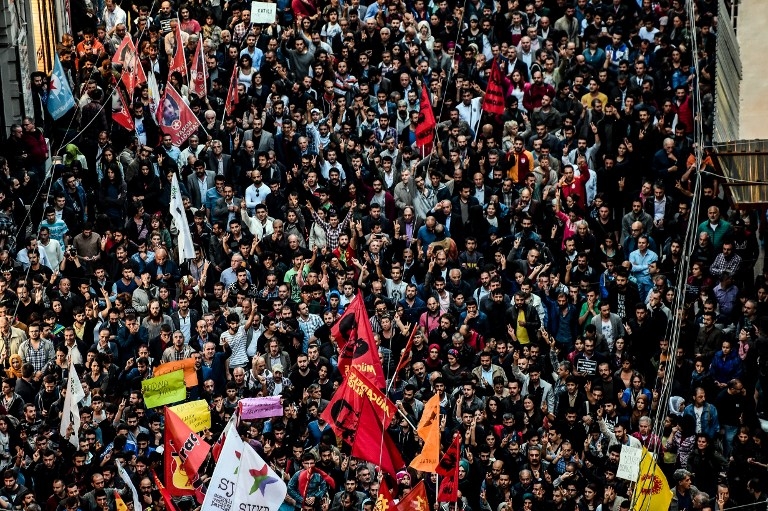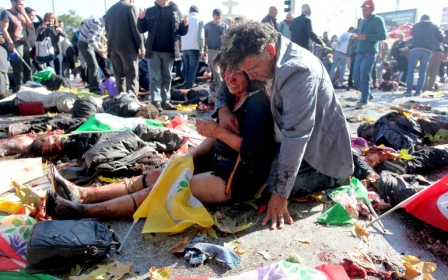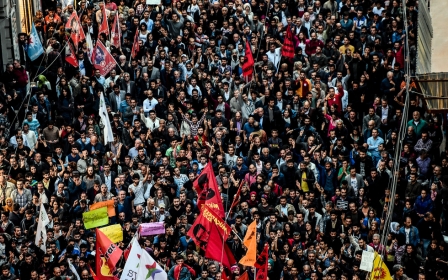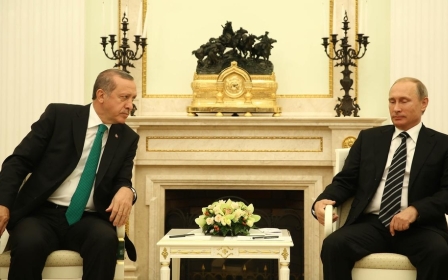Thousands rally in Ankara to remember bombing victims

Thousands rallied in Ankara on Sunday to mourn the killing of at least 95 in twin bombings at a peace protest a day earlier.
Demonstrators filled Sihhiye Square in the centre of the Turkish capital, close to the site of the blasts outside the train station.
The bombs had exploded there just after 10:00 am (0700 GMT) on Saturday, as leftist and pro-Kurdish activists gathered for a peace rally.
The attacks have intensified internal tensions in Turkey ahead of snap elections on 1 November and as the government wages a relentless offensive against the Kurdish Worker's Party (PKK).
The government has rejected accusations that it was involved, saying the bombings were "a terrorist act". Interior Minister Selami Altinok has insisted he will not resign.
Prime Minister Ahmet Davutoglu has declared three days of national mourning, with flags flying at half mast across the country.
"A bomb into our hearts," read a headline in Hurriyet Daily. "The deeply outraged public is waiting to find out who is behind the incident," it added.
President Recep Tayyip Erdogan condemned the "heinous" attack in a statement and cancelled a visit to Turkmenistan. But has yet to speak in public after the bombings.
A rally against the attack also took place in Istanbul on late Saturday evening with an estimated 10,000 taking to the streets.
The premier's office said that 95 people were killed and that 246 people were wounded in the bombings, with 48 still in intensive care. An AFP correspondent said that the scene of the blast was littered with ball bearings, suggesting the bombers had aimed for maximum fatalities.
Turkey's pro-Kurdish Peoples' Democratic Party (HDP), one of the groups that called the peace rally, put the death toll at 128 in a tweet from their official account, but this figure was not confirmed by the government.
HDP leader Selahattin Demirtas blamed a "mafia state" and a "state mentality which acts like a serial killer" for the attack.
Rising death toll
The death toll surpasses that of the twin bombings in Reyhanli on the Syrian border in May 2013 that killed over 50 people, making it the deadliest in the history of the Turkish Republic.
With international concern growing over instability in the key NATO member, US President Barack Obama offered his condolences to Erdogan and solidarity "in the fight against terrorism".
EU foreign policy chief Federica Mogherini urged Turkey to "stand united against terrorists".
The attacks drove a knife through the heart of the normally placid Ankara, which became Turkey's capital following the founding of the modern Turkish Republic by Mustafa Kemal Ataturk.
No group has claimed responsibility for the bombings, and so far there have been no arrests by the authorities.
But the premier said groups including Islamic State (IS), the Kurdistan Workers' Party (PKK) and the far-left Revolutionary People's Liberation Party–Front (DHKP-C) were capable of carrying out such an attack.
Davutoglu said there were "strong signs" the attack was carried out by two suicide bombers.
Poll campaigning suspended
Amateur footage filmed moments before the blasts showed smiling activists holding hands and dancing before suddenly falling to the ground as a huge explosion went off behind them.
The attack came just under three months after a suicide bombing blamed on IS against peace activists in the border town of Suruc on the Syrian border killed 33 people.
That bombing caused tensions to spiral between the government and the Kurdish minority. The PKK resumed attacks on security forces after a two-year truce. The PKK meanwhile accused Turkey of allowing IS to flourish, and began targeting Turkish military targets in response.
The military hit back against the PKK, proclaiming a "war on terror" and bombing targets in southeast Turkey and northern Iraq.
Political tensions have also remained high in Turkey after inconclusive parliamentary elections in June saw the ruling Justice and Development Party (AKP) lose its overall majority for the first time since it came to power in 2002.
Efforts to form a coalition were unsuccessful and Erdogan called new polls for 1 November. All parties have now suspended campaigning in the wake of the attack.
The PKK had announced on Saturday that it would suspend all attacks - except in self defence - ahead of the polls.
Middle East Eye propose une couverture et une analyse indépendantes et incomparables du Moyen-Orient, de l’Afrique du Nord et d’autres régions du monde. Pour en savoir plus sur la reprise de ce contenu et les frais qui s’appliquent, veuillez remplir ce formulaire [en anglais]. Pour en savoir plus sur MEE, cliquez ici [en anglais].




